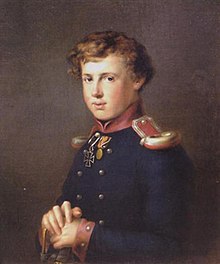Prince George Bernhard of Anhalt-Dessau
| George Bernhard | |
|---|---|
| Prince of Anhalt-Dessau | |
 | |
| Born | 21 February 1796 Dessau, Anhalt |
| Died | 16 October 1865 (aged 69) Dresden, Saxony |
| Spouse | Karoline of Scharzburg-Rudolstadt Theresa Emma von Erdmannsdorf |
| Issue | Princess Louise Prince Frederick Count Franz of Raina Countess Mathilde of Raina Countess Helene of Raina Countess Emma of Raina Countess Maria of Raina Count Rudolf of Raina Count Karl of Raina |
| House | Ascania |
| Father | Frederick, Hereditary Prince of Anhalt-Dessau |
| Mother | Landgravine Amalie of Hesse-Homburg |
George Bernhard of Anhalt-Dessau (21 February 1796 – 16 October 1865), was a German prince of the House of Ascania from the Anhalt-Dessau branch.
He was born in Dessau, the second son of Frederick, Hereditary Prince of Anhalt-Dessau, by his wife Landgravine Amalie of Hesse-Homburg, daughter of Frederick V, Landgrave of Hesse-Homburg.
Marriages and Issue
In Rudolstadt on 6 August 1825 George Bernhard married Karoline Auguste Louise Amalie (b. Rudolstadt, 4 April 1804 – d. Rudolstadt, 14 January 1829), daughter of Prince Karl Günther of Schwarzburg-Rudolstadt, himself a son of Frederick Charles, Prince of Schwarzburg-Rudolstadt. They had two children:[1]
- Louise (b. Dessau, 22 June 1826 – d. Dessau, 18 February 1900)
- Frederick (b. Dessau, 10 June 1828 – d. Dessau, 22 June 1828).
In Dresden on 4 October 1831 George Bernhard married morganatically for a second time to Therese Emma von Erdmannsdorf (b. Dresden, 12 September 1807 – d. Mannheim, 28 February 1848), of lesser nobility. She was created Countess of Raina (incorrectly spelled Reina by the Almanach of Gotha) shortly after their marriage. They had seven children:[2]
- Count Franz of Raina (b. Dessau, 2 September 1832 – d. Schloss Gross-Kühnau, 17 September 1879).
- Countess Mathilde of Raina (b. Dessau, 7 October 1833 – d. Dresden, 8 February 1917), married on 19 May 1859 to Otto von Könneritz (b. 24 October 1835 – d. Dresden, 27 November 1866).
- Countess Helene of Raina (b. Dessau, 1 March 1835 – d. Rudolstadt, 6 June 1860), adopted by her uncle William on 1 April 1855 and given the title of "princess of Anhalt" by the reigning duke Leopold IV of Anhalt-Dessau; married on 7 August 1855 to Frederick Günther, Prince of Schwarzburg-Rudolstadt, her uncle (widow of her paternal aunt Amalie Auguste). The union was considered morganatic according to the family law of the House of Schwarzburg.[3]
- Countess Emma of Raina (b. Dessau, 5 April 1837 – d. Dresden, 29 November 1909).
- Countess Maria of Raina (b. Dessau, 8 May 1839 – d. Dessau, 22 March 1931).
- Count Rudolph of Raina (b. Florence, 23 October 1842 – d. Dessau, 16 February 1921), married on 30 September 1882 to Emma Elisabeth Klara Marie Paris (b. Mainz, 27 February 1857 – d. Grosspaschleben, 22 February 1932).
- Count Karl of Raina (b. Florence, 15 May 1844 – d. Dresden, 27 February 1900), married in Berlin on 28 May 1887 to Cosima von Mörner (b. Koszalin (Köslin), 20 July 1865 – d. Zakrzów (Sakrau),[4] 25 August 1936); the marriage was childless and the couple divorced in 1893. On 17 August 1894 he married for a second time to Countess Marie von der Groeben (b. Berlin, 23 July 1841 – d. Dresden, 29 December 1894); this marriage lasted only four months until Marie's death.
Prince George Bernhard died in Dresden.
References
- ^ Marek, Miroslav. "Complete Genealogy of the House of Ascania". Genealogy.EU.[self-published source][better source needed]
- ^ Chronological Dates in Stoyan Archived 9 March 2015 at Wikiwix
- ^ House Laws of Schwarzburg
- ^ Two places have the Polish name Zakrzów and the German exonym Sakrau: de:Zakrzów (Opole) and a village in Kotla. It may no longer be possible to decide which of those places is meant.
